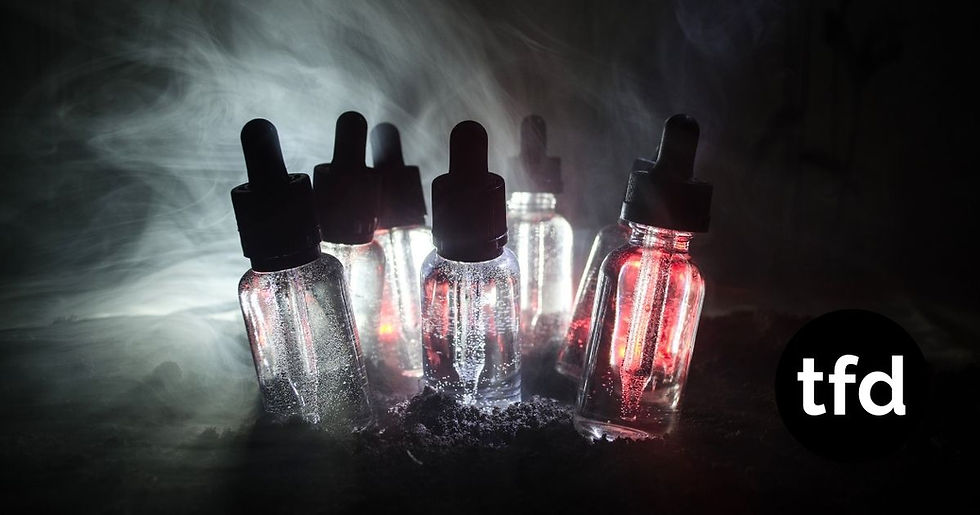Guarding The Youth Against the Lure and Dangers of Vaping
- By The Financial District

- Aug 16
- 3 min read
Updated: Aug 17
Vaping — the inhaling of mist (aerosol) created by an electronic cigarette (e-cigarette) or other vaping device and marketed as a "pleasurable and safe" alternative to smoking — has increasingly caused alarm in the Philippines, especially as this vice aggressively targets the youth, who make up the bulk of its victims.

According to the Department of Health (DOH), vapes and vapor products pose significant health risks, including E-Cigarette or Vapor Product Associated Lung Injury (EVALI), nicotine addiction, and respiratory and cardiovascular diseases, among others.
In 2024, the Philippines reported its first EVALI-linked death — a 22-year-old male who had no prior history of smoking or other vices, but who had started vaping at a young age.
He died from a heart attack caused by severe lung injury attributed to vaping, the DOH said.
The Philippines accounts for 2.7 million vape users — around 3% of the global total, according to the 2019 Global Youth Tobacco Survey (GYTS).
The survey also revealed that 24.5% of students had tried vaping. Among adolescents aged 13–15, 14.1% are current e-cigarette users, surpassing the 12.5% who use traditional tobacco.
To help protect the youth from the lure of vaping, the Department of Trade and Industry (DTI) recently released Department Administrative Order No. 25-09 (DAO 25-09), titled “Prescribing Guidelines on Identifying Illegal Flavor Descriptors in Vaporized Nicotine and Non-Nicotine Products, and Novel Tobacco Products.”
Through the Order, the agency aims to strengthen the rules for detecting flavor descriptors that unduly appeal to minors and lure them into the habit.
This move is pursuant to Republic Act No. 11900 (RA 11900), more popularly known as the Vaporized Nicotine and Non-Nicotine Products Regulation Act, or the Vape Law, the DTI said.
The agency cited Sections 12(a) and 12(j) of the Act, which prohibit advertisements and packaging that target minors. This includes the use of cartoon characters, youth influencers, or flavor descriptors referencing fruits, candies, desserts, and branded sweets, it stressed.
The DTI has called on manufacturers, importers, distributors, and retailers to comply with the new regulations on identifying flavor descriptors, warning that violators will face penalties under RA 11900, including applicable administrative fines and other sanctions under DTI rules.
The department has also been conducting crackdowns on the sale of vaping products near schools, as mandated by RA 11900.
A total of 49,981 vape units were seized from January 2024 to June 2025, as these were being sold near schools in direct violation of the law.
RA 11900 strictly prohibits the sale, promotion, advertisement, and demonstration of vape products within 100 meters of schools and other places frequented by minors. The intensified crackdown aims to curb youth access to vaporized nicotine and non-nicotine products.
As a result, 22 notices of violation (NOVs) were issued to non-compliant establishments, the DTI said.
First-time violators face a fine of PHP 10,000 or imprisonment of up to 30 days, at the discretion of the court. Repeat offenses carry both penalties and the revocation of business permits. For business entities, the owner, president, or manager will be held liable.
Meanwhile, minors caught selling, buying, or using vape products will be referred to intervention programs handled by the DOH and the Department of Social Welfare and Development, the DTI added.
“This is in line with the government’s commitment to protect youth and safeguard public health,” the department underscored.
President Ferdinand Marcos Jr. has also stressed: "If we look at the packaging, it’s clearly designed for the youth. So, their target market is really the youth."
The President personally led the inspection and destruction of seized smuggled electronic vapes worth PHP 3.26 billion last April at the Bureau of Customs (BOC) grounds in South Harbor, Port Area, Manila.
The seized goods were part of a series of confiscations from 10 separate operations carried out by the Port of Manila (POM), the Manila International Container Port (MICP), and the BOC.
Based on data from the Department of Finance (DOF), the government is losing approximately PHP 17 billion annually due to the smuggling of vape products.
“So, first of all, they really want to teach the youth to get addicted to vaping. And what’s worse is that vapes are dangerous because they even contain poison. Plus, since they’re smuggled, we can’t inspect them. We don’t know where they’re from or what’s inside, so this is extremely dangerous to the health of young people,” the President stressed.
He vowed that concerned government agencies would continue working to combat smuggled vape products.
“We will continue to do this, and I just wanted to highlight the efforts that we are doing and the dangers that accompany these smuggled vapes are far and beyond the loss of revenue to the government. More important to us are the health issues that these smuggled vapes are raising,” Marcos emphasized.





![TFD [LOGO] (10).png](https://static.wixstatic.com/media/bea252_c1775b2fb69c4411abe5f0d27e15b130~mv2.png/v1/crop/x_150,y_143,w_1221,h_1193/fill/w_179,h_176,al_c,q_85,usm_0.66_1.00_0.01,enc_avif,quality_auto/TFD%20%5BLOGO%5D%20(10).png)










